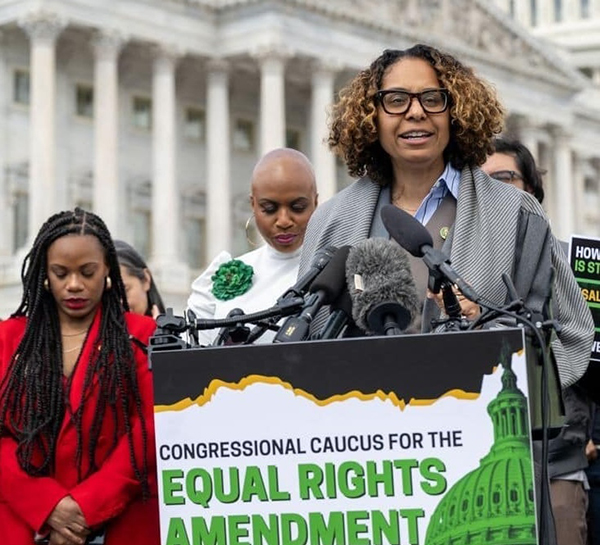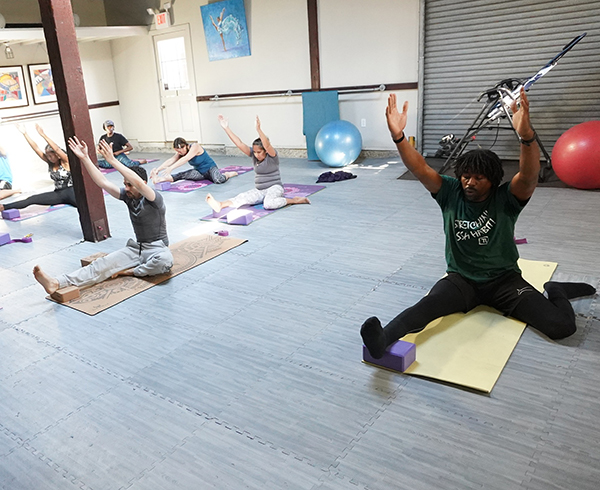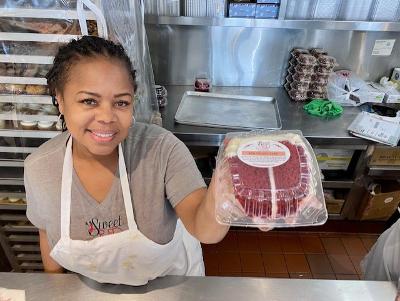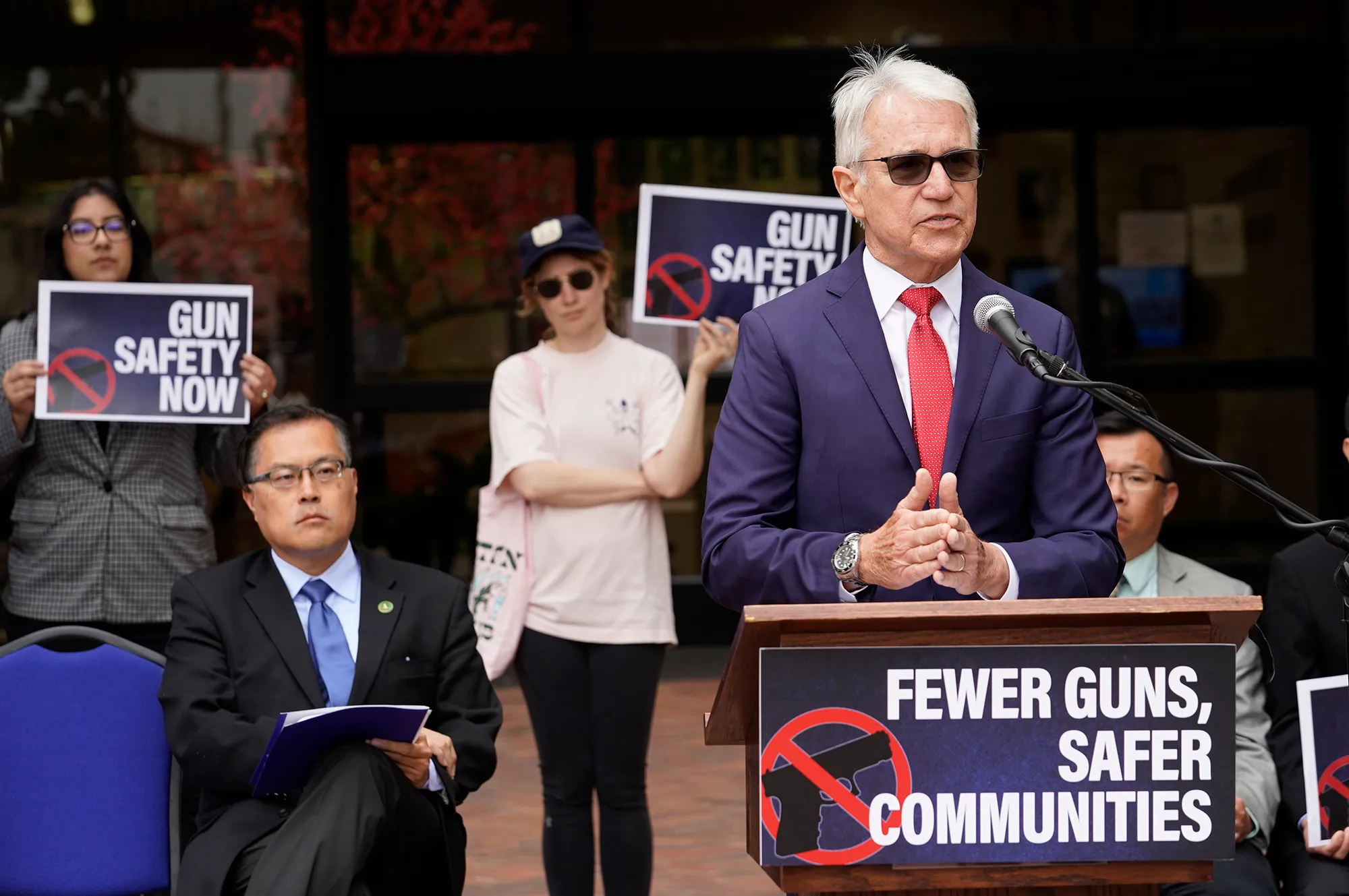‘Emotional rollercoaster’

U.S. Rep. Sydney Kamlager-Dove, shown here speaking at a political rally earlier this year, says when Black women are forced out of the labor market, the nation suffers because it loses the expertise, voices and collective brilliance of Black women.
Courtesy photo
Black women’s jobless rate crushing families, communities
By Janice Hayes Kyser
Contributing Writer
Fueled by her passion for service and purpose, Bria Crawford left her manager-level position in Oakland’s school district for a dream job at the Environmental Protection Agency — a place where she hoped to serve her country and champion health and the environment.
Within five years, Crawford would find herself out of a job, short on patience and virtually out of luck after her position was unceremoniously cut, one of thousands of victims of the Trump administration’s slash of diversity initiatives and environmental justice programs.
To say she was devastated is a grave understatement.
“There are days I’m OK and there are days I’m angry and don’t know where to start,” said Crawford, now 33. “I feel like I’m on an emotional rollercoaster.”
Her plight is far from unique. Crawford is one of more than 300,000 Black women in government and industry who have lost their jobs since Donald Trump took office this year, dealing a crushing blow to their lives, families and communities.
And statistics released last week show the problem is only getting worse. The jobless rate for Black women rose to 7.7% in September, according to the Labor Department, approaching twice the national average and the highest for Black women since August 2021.
A shaky economy and the elimination of diversity programs are dealing a devastating blow to Black women in the public and private sectors. Experts say Black women must tap into their historic resilience and creativity to make a way out of no way. (See story on page 11).
And when Black women lose their livelihood, the ravaging effect is both grim and widespread, says Fredrick Gooding Jr., associate professor of humanities at Texas Christian University.
“When Black women are vulnerable the entire Black community is vulnerable,” says Gooding, who believes Trump’s campaign to make government “more efficient” was really a veiled assault on Black workers.
“Black women are the backbone of our community and when you go after them, the entire community suffers,” he added. The true impact of that suffering, he says, could be felt for years.
David Groves, president of Blacks in Government, agrees, adding that Black women often serve as both civic leaders and primary caregivers in areas where they live, work and play.
“When their jobs are cut, it creates a ripple effect: households lose stability, children lose opportunity, and communities lose anchors of strength.”
The universal effect of such impact is as crushing as it is chilling, experts say. For example, it:
Takes a personal toll: The psychological impact of being targeted and feeling underappreciated in the workforce takes its toll on Black women by shaking their confidence in an environment where their contributions often are dismissed and their roles diminished.
Stresses the Black family: Because Black women frequently are the backbone of the Black family — raising their families with confidence and courage — the loss of high-paying jobs is a blow to the economic security and generational wealth of the Black family.
Devastates the community: Black women are champions for their communities, volunteering, donating and stepping in to fill the gaps. When they suffer, the entire community suffers — churches see fewer dollars in their coffers, Black businesses lose customers and social and civic organizations face shortfalls in both time and money.
Adding insult to injury, Crawford says, is the deafening silence she hears from Black leaders about what she refers to as a mass exodus of Black women from the workforce.
“I’m deeply disappointed. Black women are under attack in the workforce, and it seems like for the most part, there has only been silence from our leaders,” she said. “It’s sad that the most educated people in the country are Black women and right now we’re struggling because people don’t want to see us flourish.”
Patricia Brown Jones can testify. After 44 years in government — recently as acting director for the National Oceanic and Atmospheric Administration’s Office of Inclusion and Civil Rights — Jones said she felt like she was forced out after being trolled on social media and getting threatening calls and messages criticizing her role in diversity and inclusion.
“You work hard and you pledge your allegiance to the country to serve the American people every blessed day and then you go through this,” Jones said. “I feel let down, unappreciated and abused. But I am not going to stop fighting.”
Alicia Smith, a senior director for a leadership program at a global family foundation, shares that sentiment. Smith is grappling with the loss of her private sector job after seven years.
“It’s deeply destabilizing to lose your income, sense of purpose, and, oftentimes, the identity that can come from work,” says Smith, who lives in Atlanta. “I didn’t anticipate that I’d be navigating the most challenging job market that I’ve ever experienced.”
Los Angeles-based activist Earl Ofari Hutchinson says through its actions, the Trump administration and corporate America are sending Black women an unequivocal message: We don’t care about you.
“This administration is telling Black women no matter how skilled, talented or proficient you are, you are expendable,” Hutchinson said.
That expendability hurts all of America, not just Black people, says U.S. Rep. Sydney Kamlager-Dove, D-Los Angeles. It also means that the U.S. workforce is missing out on the expertise, voices and lived experiences of Black women.
“Black women open doors for everyone,” said Kamlager-Dove, who represents California’s 37 th District. “I don’t blame those who have lost their jobs or been forced out for their anger. I appreciate them being honest about their grief.”
And she says the situation is likely to get worse before it gets better. Black women are the proverbial “canaries in the coal mine,” she says — a signal of impending danger for the country and the economy as a whole.
“This is an issue everyone should be looking at and talking about,” says Kamlager-Dove, who is pushing for the Trump administration to share employment data aggregated by race and gender. “What we are seeing is a precursor to a larger economic distress that many people will be faced with soon.”
Morgan Harper, policy director for the American Economic Liberties Project, said due to historic discrimination in the private sector, public service has long extended a financial lifeline to many Black Americans. Now, the collapsing line between corporate interests and big government is threatening that lifeline.
“We (America) allowed for an economy with giants running the show,” said Harper, a former senior advisor with the federal Consumer Protection Agency. “What we are witnessing is a total takeover of government by big business.
“Buckle up for a bumpy ride ahead.”
Janice Hayes Kyser is a freelance reporter for Wave Newspapers.





